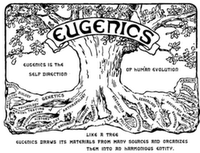Eugenics and Utopia
 Definitions of the term vary. The term eugenics is often used to refer to a movement and social policy that was influential during the first half of the twentieth century. In an historical and broader sense, eugenics can also be a study of "improving human genetic qualities".
Definitions of the term vary. The term eugenics is often used to refer to a movement and social policy that was influential during the first half of the twentieth century. In an historical and broader sense, eugenics can also be a study of "improving human genetic qualities".Eugenics is a social philosophy which advocates the improvement of human hereditary traits through various forms of intervention. The purported goals have variously been to create healthier, more intelligent people, save society's resources, and lessen human suffering. Earlier proposed means of achieving these goals focused on selective bredding while modern ones focus on prenatal testing and screening, genetic counseling, birth control, in vitro fertilization, and genetic engineering. Critics argue that eugenics is immoral, and is based in or is itself a pseudoscience. Historically, eugenics has been used as a justification for coercive state-sponsored discrimination and severe human rights violations, such as forced sterilization (e.g., of those perceived to have mental or social defects) and even genocide.
Selective breeding of human beings was suggested at least as far back as Plato. From its inception, eugenics (derived from the Greek "well born" or "good breeding") was supported by prominent thinkers. Its scientific reputation tumbled in the 1930s, a time when Ernst Rudin began incorporating eugenic rhetoric into the racial policies of Nazi Germany.
Liberal eugenics is the study and use of reproductive and genetic technologies to improve human beings, specifically in regard to biological characteristics and capacities.
In modern times eugenics has fallen out of favor by most of the scientific community for it's horrific outcomes. Today it is used on a very minute scale, such as the Human Genome Project.
Here are two of the main ideas around eugenics.
Genetic determinism is the idea that genes determine a physical or behavioural phenotype. The term may be applied to the mapping of a single gene to a single phenotype or to the idea that all phenotypes are determined by genes. While the former is well established, the latter is generally rejected by biologists, and is poorly defined.
Biological determinism is the hypothosis that biological factors such as an organism's individual genes (as opposed to social or environmental factors) completely determine how a system behaves or changes over time.
So how does this fit into Utopia and more importantly Lost. First we must examine Utopia and what it is.
Utopia, in its most common and general positive meaning, refers to the human efforts to create a better, or perhaps perfect society. Ideas which could be/are considered able to radically change our world are often called utopian ideas. There are many types of utopia as well.
Economic utopia:
These utopias are based on economics. Most of them formed in response to the harsh economic conditions of the 19th century.Political and historical utopia:
Political utopias are ones in which the government establishes a society that is striving toward perfection.Religious utopia:
These utopias are based on religous ideals, and are to date those most commonly found in human society. Their members are usually required to follow and believe in the particular religious tradition that established the utopia.Scientific and technological utopia:
These are set in the future, when it is believed that advanced science and technology will allow utopian living standards; for example, the absence of death and suffering; changes in human nature and the human condition. These utopian societies tend to change what "human" is all about. In place of the static perfection of a utopia, libertatian transhumanists envision an " extropia", an open, evolving society allowing individuals and voluntary groupings to form the institutions and social forms they prefer.A variation on this theme was found earlier in the theories of Eugenics. Believing that many traits were hereditary in nature, the eugenists believed that not only healthier, more intelligent race could be bred, but many other traits could be selected for, including "talent", or against, including drunkness and criminality. This called for "positive eugenics" encouraging those with good genes to have children, and "negative eugenics" discouraging those with bad genes, or preventing them altogether by confinement or forcible sterilization.
Opposing this optimism is the prediction that advanced science and technology will, through deliberate misuse or accident, cause environmental damage or even humanity's extinction.
So one can gather that the two are somewhat related to each. How they relate to Lost, well, that is up to you. There is a clear line in my mind as to what The Hanso Foundation is doing in their labs in regard to both of these concepts. I beleive that they are trying to create or have created a scientific and technological utopia and using egenics to keep the selected few from creating sub-par offspring. Could this be related to The Valenzetti Equation and the impending apocolypse. Creating a culture, society, habitat, etc. to continue on as the human race while the earth re-sets itself? More questions than answers I am afraid...
Comment away...
Peace & Namaste! - Thrasher76



2 Comments:
great post! i think you're on the right track. using eugenics to create a utopian society in a post apocalyptic world fills the needs of a complex scientific motive that is fairly straightforward to explain. i think this could be the backbone of the lost story!
Vet nice Thrasher, Thanks so much for this....I like the research blog because their is so much info on it....You guys are soooooo smart
Post a Comment
<< Home